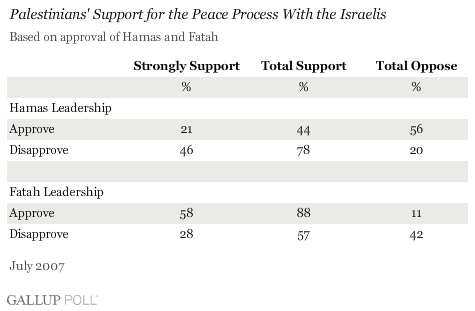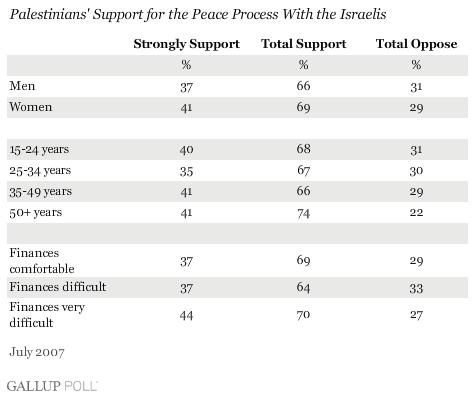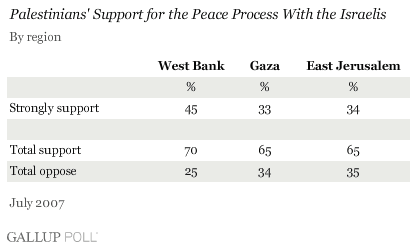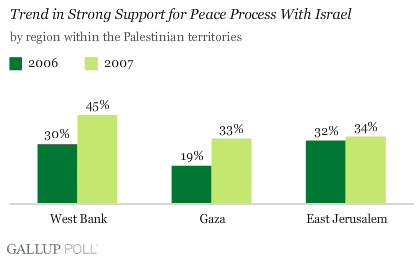This is the fifth installment in a series examining attitudes toward the peace process among Israelis and Palestinians.
PRINCETON, NJ -- Gallup Polls conducted in the Palestinian territories in January 2006 and July 2007 document increased enthusiasm for the peace process with Israel. While the increase is not extraordinary, it is enough to be notable and relevant as the Palestinian and Israeli governments commence a yearlong process of negotiations working toward a comprehensive peace settlement.
In both surveys, Gallup found a majority of Palestinians saying they support the peace process to some extent, however, the percentage saying they strongly support it increased from 26% in 2006 to 39% in 2007.
These surveys bracket the sweeping victory of Hamas in the 2006 Palestinian parliament elections, and the resulting conflict between the Hamas and Fatah political groups, which culminated in Hamas wresting physical control of the Gaza Strip in June 2007. The 2006 survey was conducted just weeks before the Jan. 25 Palestinian elections, and the 2007 survey was conducted just weeks after Hamas fighters drove Fatah forces out of Gaza and the Palestinian unity government dissolved.
The surveys show no increase in Palestinians' warmth toward Israel or its leaders, per se, over this period. Rather, reading between the lines, it seems that Palestinians' unease about the domestic standoff has strengthened their resolve for achieving an independent Palestinian state through diplomatic negotiations with Israel.
Who Supports Peace?
The main pocket of substantial support for the peace process in 2007 is found among supporters of the Fatah government, not surprisingly because this position is generally associated with the Fatah party. Conversely, Hamas supporters are the strongest opponents of the process.
At the time of the survey, approximately a third of all Palestinians said they approved of the Fatah leadership and about a quarter approved of the Hamas leadership. The percentage strongly favoring the peace process is 58% among the former and 21% among the latter.
Additionally, the vast majority of those who approve of Fatah (88%) support the peace process either moderately or strongly, whereas more than half of those who approve of the Hamas leadership (56%) oppose the peace process.

Aside from partisan differences, a majority of Palestinians across all major demographic groups -- as well as in all three major regions of the territories -- either moderately support or strongly support the peace process. However, those who strongly support the peace process could be vital in terms of buttressing the internal political position of Palestinian Prime Minister Mahmoud Abbas and strengthening his hand at the peace table.
The survey suggests that Abbas and his fellow peace-makers will find a fairly consistent 35% to 45% of Palestinians in strong support of the peace process across Palestinian society.
- There is no significant difference in the percentage of men and women saying they strongly support the peace process.
- There are no significant differences by age.
- About a third of Palestinians (35%) describe their personal finances as comfortable or enough to get by; another third (33%) say their finances are difficult, while 29% describe them as very difficult. But the percentage strongly supporting the peace process is about the same for each group, ranging between 37% and 44%.

Residents of the West Bank are more likely to strongly support the peace process than are those in Gaza and East Jerusalem.

Gallup trends show that support for peace by area of residence has increased in both the West Bank and Gaza, but not in Jerusalem.

Bottom Line
A majority of Palestinians express support for resolving the Palestinian-Israeli conflict through the peace process. This is seen in their direct support for the peace process, as well as in another poll result showing 62% in favor of "mostly nonviolent forms of resistance and negotiation" and only 28% choosing "mostly armed struggle and military solutions" as the preferred means to achieving self-determination and security.
While Palestinians who strongly support the peace process are in the minority, they can be found in about equal numbers throughout society and in all regions of the territories. Abbas appears to be acting in accordance with the wishes of the supporters of his Fatah party by pursuing diplomatic negotiations with Israel following the Annapolis, Md., peace conference. The only major source of opposition comes from within the ranks of Hamas supporters.
Survey Methods
Results from the Palestinian territories are based on face-to-face interviews conducted July 9-23, 2007, with a randomly selected sample of 1,000 Palestinian residents, aged 15 and older. For results based on the Palestinian sample, one can say with 95% confidence that the maximum error attributable to sampling and other random effects is ±3 percentage points.
In addition to sampling error, question wording and practical difficulties in conducting surveys can introduce error or bias into the findings of public opinion polls.
